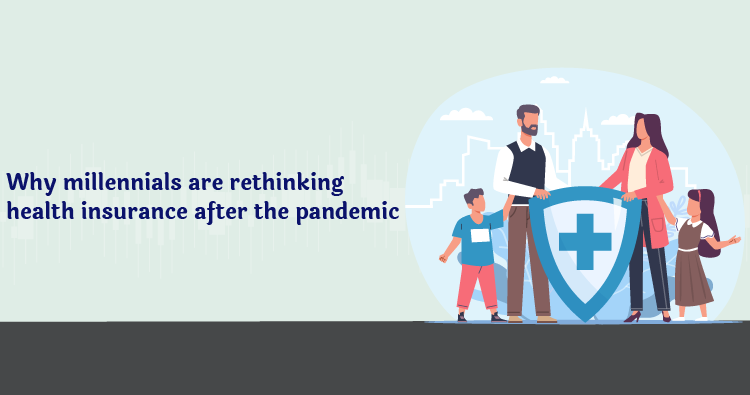- +91 9881013170
-
Certified Financial Planner®
Qualified Personal Finance Professional®
AMFI Registered-Mutual Fund Distributor

Certified Financial Planner®
Qualified Personal Finance Professional®
AMFI Registered-Mutual Fund Distributor


The COVID-19 pandemic served as a wake-up call for many millennials, a generation often labeled as carefree spenders and non-traditionalists. While their financial habits and life choices have always stood out from previous generations, the health crisis reshaped their perspective on many fronts, particularly regarding health insurance. Suddenly, the invincibility of youth felt like an illusion, and the need for robust health coverage became a priority. Here’s why millennials are now placing greater emphasis on securing health insurance that works for them.
Before the pandemic, many millennials operated under the belief that their youth and relatively good health shielded them from significant medical expenses. However, the reality of COVID-19 turned this assumption on its head. Stories of young, otherwise healthy individuals facing prolonged hospital stays and massive medical bills dominated the news. These narratives shattered the illusion of immunity and underscored the unpredictable nature of health risks, pushing millennials to take health insurance seriously for the first time.
If there’s one lesson the pandemic taught everyone, it’s just how expensive healthcare can be. The costs of ICU stays, ventilators, and treatments for complications like long COVID left many families financially strained. For millennials, a generation already burdened with student loans, credit card debt, and rising living expenses, these staggering costs illuminated the importance of having a financial safety net in the form of health insurance. Suddenly, what seemed like an optional expense became a non-negotiable investment in financial security.
The pandemic didn’t just wreak havoc on physical health; it also took a toll on mental well-being. Anxiety, depression, and burnout became common experiences during lockdowns and periods of isolation. Millennials, who have championed the importance of mental health more than any previous generation, started looking for health insurance plans that include coverage for therapy, counseling, and mental health treatments. This shift reflects not only a broader acceptance of mental health challenges but also a demand for holistic healthcare solutions.
For many millennials, the pandemic was a reminder of life’s fragility, sparking conversations around family planning and caregiving. As some started families or took on responsibilities for aging parents, the need for comprehensive health insurance covering maternity, pediatric care, and eldercare became evident. These policies are no longer seen as optional but as critical tools to ensure the well-being of loved ones during emergencies.
5. Employer-provided insurance is Not Enough
Relying solely on employer-provided health insurance was another risk the pandemic exposed. Job losses and career shifts during COVID-19 left many without coverage at the worst possible time. This experience prompted millennials to explore individual health policies that offer broader protection and portability, regardless of employment status. These independent plans ensure continuity and peace of mind, even during periods of professional instability.
The adage “prevention is better than cure” gained new meaning during the pandemic. Millennials, more aware than ever of the benefits of preventive care, are actively seeking health insurance policies that incentivize wellness programs, regular check-ups, fitness activities, and vaccinations. Policies that reward healthy lifestyles with lower premiums or added benefits have become especially attractive.
Recognizing this generation’s unique needs, insurance providers have started offering customizable plans that align with millennials’ lifestyles. Features like affordable premiums for young policyholders, critical illness add-ons, and coverage for alternative treatments resonate with their values and priorities. This level of flexibility and personalization is helping insurance become more appealing to millennials who might otherwise have viewed it as an impersonal industry.
For millennials, health insurance is no longer just a safety net; it’s an essential tool for financial empowerment. The ability to face unexpected medical emergencies without derailing their financial goals offers a sense of control and stability. This shift in perspective reflects a growing understanding that good health is foundational to building wealth and achieving life aspirations.
The pandemic redefined how millennials view health insurance. It’s no longer just another item on the to-do list or an optional expense—it’s a cornerstone of financial and personal well-being. By embracing health coverage tailored to their needs, millennials are not only safeguarding their health but also taking a proactive step toward a more secure future.
For those who’ve yet to revisit their health insurance plans, now is the perfect time. With rising healthcare costs, the unpredictability of life, and the growing emphasis on mental and preventive health, investing in the right insurance policy isn’t just smart—it’s essential. Millennials are proving that being prepared isn’t just a responsibility; it’s a way to thrive in an uncertain world.
This blog is purely for educational purposes and not to be treated as personal advice. Insurance is a subject matter of solicitation.
Flat no. 104, Bldg. No. 7,
Ved Vihar, Paud Road,
Kothrud, Pune 411038
+91 9881013170
+91 7769953077
